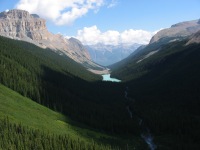Difference between revisions of "Valley"
m (Text replacement - "http://nordan.daynal.org" to "https://nordan.daynal.org") |
m (Text replacement - "http://" to "https://") |
||
| Line 3: | Line 3: | ||
==Origin== | ==Origin== | ||
[https://nordan.daynal.org/wiki/index.php?title=English#ca._1100-1500_.09THE_MIDDLE_ENGLISH_PERIOD Middle English] ''valeye'', from Anglo-French ''valee'', from ''val'' valley | [https://nordan.daynal.org/wiki/index.php?title=English#ca._1100-1500_.09THE_MIDDLE_ENGLISH_PERIOD Middle English] ''valeye'', from Anglo-French ''valee'', from ''val'' valley | ||
| − | *[ | + | *[https://en.wikipedia.org/wiki/14th_century 14th Century] |
==Definitions== | ==Definitions== | ||
*1a : an elongate depression of the [[earth]]'s [[surface]] usually between ranges of hills or [[mountains]] | *1a : an elongate depression of the [[earth]]'s [[surface]] usually between ranges of hills or [[mountains]] | ||
| Line 11: | Line 11: | ||
:b : the place of meeting of two slopes of a roof that form on the plan a reentrant angle | :b : the place of meeting of two slopes of a roof that form on the plan a reentrant angle | ||
==Description== | ==Description== | ||
| − | In [[geology]], a '''valley''' or dale is a depression with predominant extent in one direction. A very deep [[river]] valley may be called a [ | + | In [[geology]], a '''valley''' or dale is a depression with predominant extent in one direction. A very deep [[river]] valley may be called a [https://en.wikipedia.org/wiki/Canyon canyon] or gorge. |
The terms U-shaped and V-shaped are descriptive terms of geography to characterize the form of valleys. Most valleys belong to one of these two main types or a mixture of them, at least with respect of the cross section of the slopes or hillsides. | The terms U-shaped and V-shaped are descriptive terms of geography to characterize the form of valleys. Most valleys belong to one of these two main types or a mixture of them, at least with respect of the cross section of the slopes or hillsides. | ||
| − | A valley in its broadest [[geographic]] sense is also known as a ''dale''. A valley through which a [[river]] runs may also be referred to as a ''vale''. A small, secluded, and often wooded valley is known as a [ | + | A valley in its broadest [[geographic]] sense is also known as a ''dale''. A valley through which a [[river]] runs may also be referred to as a ''vale''. A small, secluded, and often wooded valley is known as a [https://en.wikipedia.org/wiki/Dell_(landform) dell] or in Scotland as a glen. A wide, flat valley through which a river runs is known in Scotland as a ''strath''. A [https://en.wikipedia.org/wiki/Cove_(Appalachian_Mountains) mountain cove] is a small valley, closed at one or both ends, in the central or southern [https://en.wikipedia.org/wiki/Appalachian_Mountains Appalachian Mountains] which sometimes results from the [[erosion]] of a geologic window. A small valley [[surrounded]] by [[mountains]] or ridges is sometimes known as a ''[[hollow]]''. A deep, narrow valley is known as a ''coon'' (also spelled ''combe'' or ''coombe''). Similar geological structures, such as [https://en.wikipedia.org/wiki/Canyon canyons], [https://en.wikipedia.org/wiki/Ravine ravines], gorges, [https://en.wikipedia.org/wiki/Gully gullies], and kloofs, are not usually referred to as valleys.[https://en.wikipedia.org/wiki/Valley] |
[[Category: Earth Science]] | [[Category: Earth Science]] | ||
Latest revision as of 02:44, 13 December 2020
Origin
Middle English valeye, from Anglo-French valee, from val valley
Definitions
- b : an area drained by a river and its tributaries
- 2: a low point or condition
- 3a : hollow, depression
- b : the place of meeting of two slopes of a roof that form on the plan a reentrant angle
Description
In geology, a valley or dale is a depression with predominant extent in one direction. A very deep river valley may be called a canyon or gorge.
The terms U-shaped and V-shaped are descriptive terms of geography to characterize the form of valleys. Most valleys belong to one of these two main types or a mixture of them, at least with respect of the cross section of the slopes or hillsides.
A valley in its broadest geographic sense is also known as a dale. A valley through which a river runs may also be referred to as a vale. A small, secluded, and often wooded valley is known as a dell or in Scotland as a glen. A wide, flat valley through which a river runs is known in Scotland as a strath. A mountain cove is a small valley, closed at one or both ends, in the central or southern Appalachian Mountains which sometimes results from the erosion of a geologic window. A small valley surrounded by mountains or ridges is sometimes known as a hollow. A deep, narrow valley is known as a coon (also spelled combe or coombe). Similar geological structures, such as canyons, ravines, gorges, gullies, and kloofs, are not usually referred to as valleys.[1]
